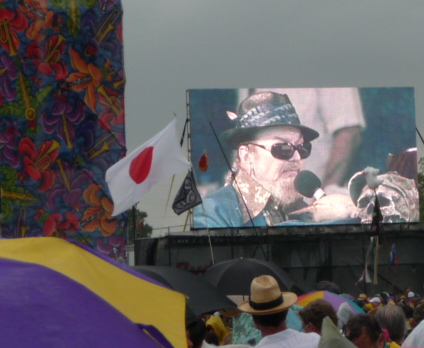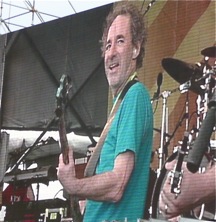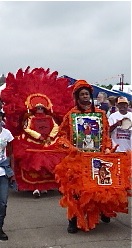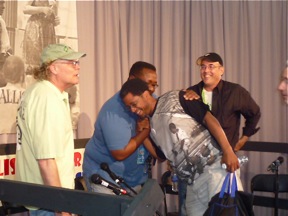
On Friday he let loose in song about a city that "used to be hip with its corruption and decay." Over the years reporters puzzling over why is Dr. John so angry about New Orleans recovery remind me of those interviewing John Goodman's professor on Treme. If you have to ask, you probably haven't been listening.
Also appearing at the Allison Miner Music Heritage Stage today, Dr. John will share memories of his friend, the late Bobby Charles. Charles wrote a string of hits including "Walking to New Orleans," and he and Dr. John had been working on a CD before he died. Last year at the Music Heritage Stage, David Fricke of Rolling Stone Magazine asked Wilco's John Stirratt for CD recommendations and John mentioned a new Bobby Charles compilation. Dr. John later relayed the compliment to Charles who at first thought Wilco was a washing machine, but I'm glad he heard about a compliment from the stage.
This weekend's multiple tributes remind us of what a devastating year it's been for cultural icons. Marva Wright was memorialized in the blues tent, David Mills at the Treme panel, Alex Chilton as Bonerama played his Boxtops hit "The Letter." Mortality seemed to be an inescapable theme, and no one honors fallen heroes like New Orleans. Terence Blanchard touched on this when he had the Herculean task of following George Clinton at the Allison Miner Music Heritage stage (I seem to be spending most of my weekend there, and not just because it's been raining). Blanchard shared stories of the mentors who brought him to a place where he was able to compose "A Tale of God's Will (A Requiem for Katrina)" after writing the score to Spike Lee's When the Levees Broke.

At the Treme panel, Pierce bridged the gap between locals and Hollywood, as well as Elie who he introduced as, "My childhood friend, my boy from the Treme and uptown, Ben Franklin - Holler!" He referenced "City of Refuge" by Piazza and "Faubourg Treme: The Untold Story of Black New Orleans" by Elie as why the show's writing is so authentic. "We hold our culture very dear. We should never lose the ability to be offended when it's not done right." He described how, "I have been stopped by everybody on every corner - say bro, when you second line you don't use the left foot like that ..." to audience laughter.
Shearer described musicians saying in regard to Spinal Tap, "I couldn't watch that, man, it was too much like my life." On a more somber note he said the same goes for some New Orleans residents, and Treme. It's hard to revisit journey home post-Katrina when we're still living it. Piazza explained, "Everybody who was here knows what it takes and what it took to stay here or to come back after what that was. And New Orleans has almost encoded into its culture all kinds of strategies for comporting ourselves with grace and style and defiant wit in the face of mortality."
He talked of finding a distance to revisit that time without breaking down crying while walking down the street. Pierce added to that with, "It's art imitating life and life imitating art and we're going through it again as a company - the ups and downs of life. In the past month we've lost in the cast and crew four people at a time when things are rising on the show, and it's reflected in the way people are accepting it." He compared the transition to a jazz funeral "Where you cry one moment, and then you laugh and you pour one for your boy, "He loved him some oysters, I'm going to have one for him. New Orleans more than any other place I know has the ability to teach people the importance of culture. Culture is the intersection of a people and life. How we deal with life. What thoughts are to the individual, culture is to the community as a whole."
Pierce marveled that, "That's what people are tapping into with Treme. We're actually being able to deal with what we're going through and where we've been with this piece of art. People outside New Orleans are dropped into this foreign world where:

2) It's in America. The Northernmost Caribbean city in America, but it's in America. I'm very happy to be part of something that is sparking that much humanity bubbling up to the surface."
It was beautifully expressed, but the writers were also chastised when the audience learned that the cathartic first Jazzfest post-Katrina won't be included in Treme's first season. "So like locals, you're skipping the summer," Shearer observed. Overmyer explained that HBO bought 10 episodes instead of 12 to save money for its series, Pacific. A questioner told him to, "Go back to them, tell them the Pacific war is over, my father was there."
One commenter asked about accents and Overmyer said, "Nobody's ever forgiven The Big Easy for Dennis Quaid and cher." It's true. I feel that the only way any character on Treme will now say "Cher" is if the camera pans out and Cher is sitting there like she was at the end of Sgt. Pepper's Lonely Hearts Club Band with Dr. John. So hopefully that's the final episode - Dennis Quaid, Cher, Dr. John and Big Chief Lambreaux at a bar. But again, that could just be the sinus medication talking.
Elie remarked that the show is, "Reminding ourselves and our country much as Tom Piazza did, this is a special place where people are interesting in ways that don't need to be invented." And Piazza said he's inspired in how the city has come together in embracing the show. "It's like another dimension of community in that sense. I'd be just so proud to think that this series was another step in the healing process in that way."

"It was the final scene and I was with the Treme brass band playing "Closer Walk With Thee." "There are moments like that that remind you of how wonderful this city is, how meaningful our culture is, what painful recent history we have but ultimately how triumphant we will be because we will pass through this and get to a place of renewal, joy and resurgence. And that moment for me was the moment I will always remember when doing Treme. When I realized it wasn't a job, it wasn't a script it was something that was so much more meaningful and profound."
Overmyer, a New Orleans resident for almost 20 years, concluded the afternoon with "Y'all don't know what you've done for us, so thank all of y'all." I think that sentence alone qualifies him as a local.
Treme is helping show the world a city where this weekend alone my friend Bob French celebrated the founding of his family's Original Tuxedo Brass Band 100 years ago and Lena Prima played her father Louis Prima's music on the 100th anniversary of his birth. How many cities celebrate their music 100 years later in a country that Gore Vidal calls the "United States of amnesia?" It takes a constant flow of transplants such as Overmyer to memorialize the importance of our culture. And it takes New Orleans natives like Dr. John to remind you that they already knew its importance.
As George Clinton told DJ Soul Sister at the Allison Miner Music Heritage Stage, the Mothership was originally built in New Orleans. But then, you already knew that.
Full article at NewOrleans.com.
